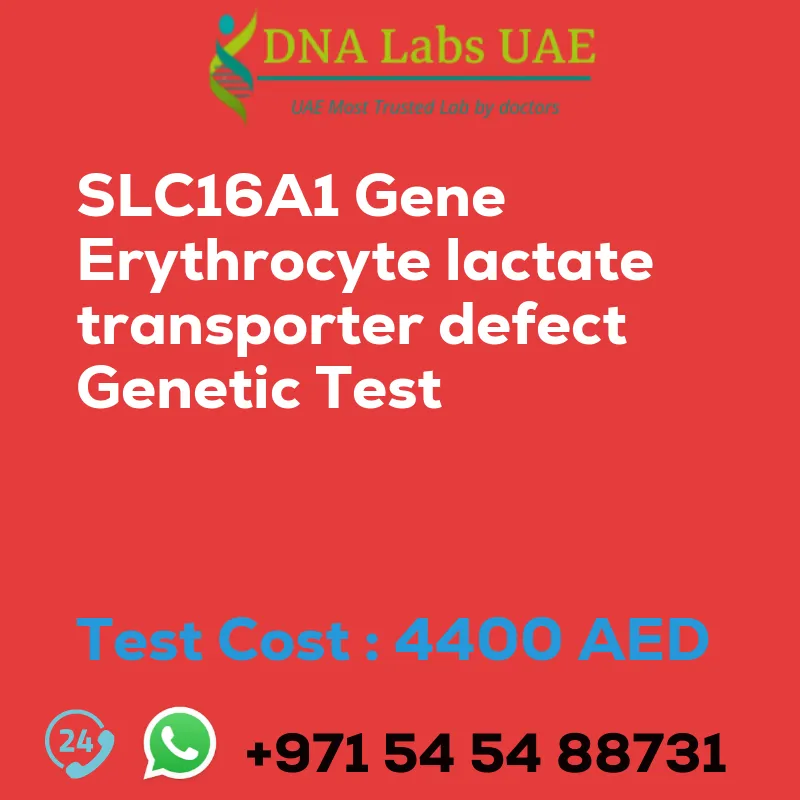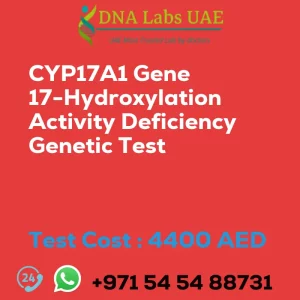SLC16A1 Gene Erythrocyte lactate transporter defect Genetic Test
Welcome to DNA Labs UAE, a leading genetic testing laboratory in the UAE. We offer a comprehensive range of genetic tests, including the SLC16A1 Gene Erythrocyte lactate transporter defect Genetic Test. In this blog, we will provide detailed information about this test, including its cost, symptoms, diagnosis, and more.
Test Name: SLC16A1 Gene Erythrocyte lactate transporter defect Genetic Test
- Components: SLC16A1 gene
- Price: 4400.0 AED
- Sample Condition: Blood or Extracted DNA or One drop Blood on FTA Card
- Report Delivery: 3 to 4 Weeks
- Method: NGS Technology
- Test type: Metabolic Disorders
- Doctor: General Physician
- Test Department: Genetics
Pre Test Information
Before undergoing the SLC16A1 Gene Erythrocyte lactate transporter defect Genetic Test, it is important to provide the clinical history of the patient. Additionally, a genetic counseling session will be conducted to draw a pedigree chart of family members affected by Erythrocyte lactate transporter defect. This information is crucial for accurate diagnosis and interpretation of the test results.
Test Details
The SLC16A1 gene, also known as the solute carrier family 16 member 1 gene, encodes a protein called the monocarboxylate transporter 1 (MCT1). This protein is primarily found in erythrocytes (red blood cells) and is responsible for transporting lactate, a byproduct of anaerobic metabolism, out of the cells. A defect in the SLC16A1 gene can result in a dysfunction or deficiency of the MCT1 protein, leading to impaired lactate transport in erythrocytes. This condition is known as erythrocyte lactate transporter defect.
NGS (Next-Generation Sequencing) genetic testing is a method used to analyze the DNA sequence of an individual’s genes. It can identify specific genetic variations or mutations in the SLC16A1 gene that may be responsible for the erythrocyte lactate transporter defect. This type of genetic testing can help diagnose individuals with the condition and provide information about its inheritance pattern.
By identifying the specific genetic variations associated with the erythrocyte lactate transporter defect, NGS genetic testing can also provide valuable information for genetic counseling and family planning. It can help determine the risk of passing on the condition to future generations and guide decisions regarding reproductive options. Additionally, it can aid in the development of targeted treatment approaches or interventions for individuals with the condition.
At DNA Labs UAE, we are committed to providing accurate and reliable genetic testing services. Our team of experienced professionals ensures that every test is performed with the utmost care and precision. If you have any questions or would like to schedule an appointment for the SLC16A1 Gene Erythrocyte lactate transporter defect Genetic Test, please contact us.
| Test Name | SLC16A1 Gene Erythrocyte lactate transporter defect Genetic Test |
|---|---|
| Components | |
| Price | 4400.0 AED |
| Sample Condition | Blood or Extracted DNA or One drop Blood on FTA Card |
| Report Delivery | 3 to 4 Weeks |
| Method | NGS Technology |
| Test type | Metabolic Disorders |
| Doctor | General Physician |
| Test Department: | Genetics |
| Pre Test Information | Clinical History of Patient who is going for SLC16A1 Gene Erythrocyte lactate transporter defect NGS Genetic DNA Test A Genetic Counselling session to draw a pedigree chart of family members affected with Erythrocyte lactate transporter defect |
| Test Details |
SLC16A1 gene, also known as the solute carrier family 16 member 1 gene, is responsible for encoding a protein called the monocarboxylate transporter 1 (MCT1). This protein is primarily found in erythrocytes (red blood cells) and is responsible for transporting lactate, a byproduct of anaerobic metabolism, out of the cells. A defect in the SLC16A1 gene can result in a dysfunction or deficiency of the MCT1 protein, leading to impaired lactate transport in erythrocytes. This condition is known as erythrocyte lactate transporter defect. NGS (Next-Generation Sequencing) genetic testing is a method used to analyze the DNA sequence of an individual’s genes. It can identify specific genetic variations or mutations in the SLC16A1 gene that may be responsible for the erythrocyte lactate transporter defect. This type of genetic testing can help diagnose individuals with the condition and provide information about its inheritance pattern. By identifying the specific genetic variations associated with the erythrocyte lactate transporter defect, NGS genetic testing can also provide valuable information for genetic counseling and family planning. It can help determine the risk of passing on the condition to future generations and guide decisions regarding reproductive options. Additionally, it can aid in the development of targeted treatment approaches or interventions for individuals with the condition. |








